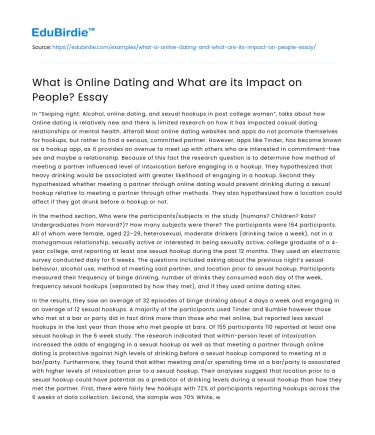Introduction
Online dating has transformed the social landscape, providing a new platform for individuals seeking romantic connections. Initially emerging in the late 1990s, online dating has grown into a multi-billion-dollar industry, reshaping how people meet and interact. As technology has advanced, so too have the platforms that facilitate these connections, from early websites to modern mobile apps. According to a 2020 study by the Pew Research Center, nearly one-third of U.S. adults have used an online dating service, reflecting its widespread acceptance and influence. This essay examines the concept of online dating, its impact on individuals, and the societal implications that stem from its proliferation. By analyzing the benefits and drawbacks, as well as addressing counter-arguments, we aim to provide a comprehensive understanding of how online dating affects people today.
The Mechanics and Popularity of Online Dating
Online dating platforms function by allowing users to create profiles where they can share personal information, interests, and preferences. Algorithms then match individuals based on compatibility, using data-driven insights to suggest potential partners. This technological mediation in personal relationships offers several advantages, notably convenience and expanded access. Users can connect with potential partners beyond their immediate social circles, broadening their opportunities to meet diverse individuals. Furthermore, online dating aligns with modern lifestyles, offering a time-efficient method of meeting people in an increasingly busy world.
Save your time!
We can take care of your essay
- Proper editing and formatting
- Free revision, title page, and bibliography
- Flexible prices and money-back guarantee
The popularity of online dating is underscored by the success stories it generates. For instance, a report by The Knot in 2020 found that 22% of newlyweds met through online dating platforms, highlighting its effectiveness in fostering long-term relationships. Moreover, the inclusivity of these platforms caters to various demographics, from different age groups to sexual orientations, thus promoting diversity and acceptance. However, the digitalization of dating does raise concerns about the authenticity of interactions, where the absence of physical cues can lead to misunderstandings and misrepresentations. Critics argue that the commodification of dating could lead to superficial relationships, where individuals are reduced to profiles and pictures.
Transitioning from the mechanics of these platforms, it is crucial to explore the psychological and emotional impacts they have on users. While online dating offers convenience and expanded options, it also introduces new challenges that can affect mental health and interpersonal dynamics.
Psychological and Emotional Impacts
The psychological effects of online dating are multifaceted, influencing both self-perception and emotional well-being. On one hand, these platforms can boost self-esteem by providing validation through matches and messages. A study published in the Journal of Social and Personal Relationships in 2019 indicated that positive feedback from online interactions can enhance users' confidence. Conversely, the same platforms can lead to negative outcomes, such as anxiety and depression, arising from rejection or negative experiences online. The phenomenon of "swiping fatigue," characterized by a sense of burnout from the repetitive nature of app usage, is a common complaint among users.
Moreover, the paradox of choice—having too many options—can lead to decision-making paralysis and dissatisfaction. Psychologist Barry Schwartz, in his book "The Paradox of Choice," argues that while choice is inherently positive, an overabundance can reduce satisfaction and increase anxiety. Online daters often face this dilemma, where the endless stream of potential partners can make it difficult to commit to a single person, fostering a culture of disposability in relationships.
As we delve into the societal implications of online dating, it is important to consider how these personal experiences aggregate to influence broader social behaviors and cultural norms.
Societal Implications and Counterarguments
Online dating has not only changed individual experiences but also impacted societal norms and behaviors. The democratization of dating has challenged traditional courtship rituals, promoting more open and diverse relationships. This shift is particularly evident in the increasing acceptance of interracial and same-sex partnerships, which online platforms facilitate by removing geographical and social barriers. However, this digital revolution has also sparked debates about privacy and security, as users must navigate issues of data protection and the potential for identity theft.
Critics of online dating argue that the platforms contribute to a decline in genuine human interactions, as digital communication often lacks the depth and emotional nuance of face-to-face encounters. According to a 2019 study in the Journal of Communication, while online interactions can lead to meaningful connections, they often require a transition to offline settings to develop fully. Despite these criticisms, proponents highlight that online dating is simply a tool that reflects existing societal trends rather than creating them.
By addressing these counterarguments, we can better understand the complex role online dating plays in modern society, balancing its benefits with the challenges it presents.
Conclusion
In conclusion, online dating has become an integral part of contemporary society, offering both opportunities and challenges. While it facilitates connections and broadens access to potential partners, it also introduces new psychological and societal dynamics that merit consideration. The impacts of online dating are not uniformly positive or negative but are instead shaped by individual experiences and societal contexts. As technology continues to evolve, so too will the nature of online dating, requiring ongoing reflection and adaptation. By understanding the nuances of online dating, individuals and society can better navigate its complexities and harness its potential for fostering meaningful relationships.






 Stuck on your essay?
Stuck on your essay?

